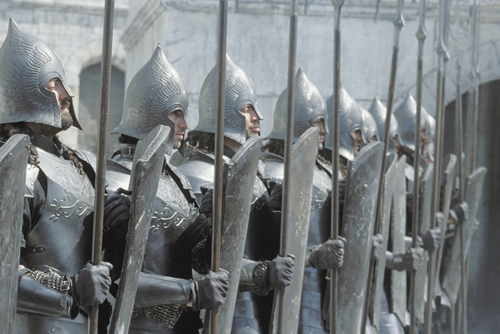With traditional publishing, the only person you have to contend with is the publisher's editor or an agent--the gatekeeper to get into the land of published authorship. You impress them with your work, and you're in, for certain values of "in". Traditional publishers have a whole horde of people whose job it is to make your book look awesome enough to be purchased, so that all you have to do is sign the contract, and then sit back and let them work this magic.
With self-publishing, however, you have to do a lot of this yourself, obviously. You need your own little fellowship of companions who take care of the various jobs involved in making your book look awesome enough to be purchased. Now, you might be able to take care of some of these jobs yourself--but that will be a hell of a lot of work. Let us look at your fellowship, shall we?
Developmental Editor
Developmental editing sounds like one of those things you can do yourself, and if you're patient it's possible that you'd be right. This part takes detachment, though, and the discipline to chainsaw out whole swaths of your manuscript and/or rewrite them if need be. If you want to take care of this yourself, you must be willing to let your manuscript hang out (in whatever format) until you have the proper detachment to perform some truly invasive surgery on the thing. This is someone who must show no mercy towards the manuscript. They must take out everything that doesn't contribute to the story. If you can't find the detachment to do that, you'll be better off hiring someone to edit for you.
Beta Reader

The beta reader is the person you give your manuscript to once it's out of the crappy rough draft stage, the person whose job it is to give the thing a second eyeball check and a second brain check to make sure that everything fits together. You absolutely cannot do this one yourself. I can't emphasize this enough. The beta reader must be at least one step removed from the manuscript. They can be a friend whose opinion your trust, or a colleague who is interested in your writing career and wants to give you honest help. He should be able to tell you if something doesn't work, or if he finds a continuity error, or even if the story doesn't work at all. He will be your peek at your potential readerbase.
Proofreader

The proofreader needs to have sharp eyes, because not even Word's spelling and grammar checker will find errors like misused words, or words misspelled so they become other words. The proofreader needs to be a fresh pair of eyes who is able to go through your manuscript with a fine-toothed comb and look for all the tiny errors that even an experience writer might miss. My proofreader has picked up things like misused commas, wonky capitalization, continuity errors (yes, again), and vocabulary derps that my mind told me afterwards that I should have seen, but I didn't. Why? Because I knew the manuscript like the back of my hand. (Or thought I did.)
Cover Artist
Unless you have Photoshop, a fair talent for graphic design, and hours to kill, you'll want to farm this one out. And honestly, if you had hours to kill, you be spending it writing. The cover artist's job is to make an eye-catching cover for your book that reflects what the story's about. I've seen some truly awful covers at the library where I work, and a lot of them came from professional publishing houses. Since you're doing this yourself, you have a bit more freedom to work alongside your artist to get the cover you want.
Formatter
The formatter's job is to take your really awesome manuscript and make it play nicely with whatever template your self-publishing company uses so it doesn't look like ass in the finished product. CreateSpace (the company I'm using for Sheep's Clothing) offers a downloadable template for Word, so that you can just copy and paste your text in there and let it do the rest, but be prepared to actually look through the result to make sure everything looks right, or else you'll have more work later on.
Printer

Unless you have a publisher-grade printer and all the equipment you could possibly need to make a book (not likely), let someone else handle this. Seriously. Print-on-demand sites allow you to acquire as many books as you need--no more and no less--so this part shouldn't be all that hard. Let their army of professionals assemble your book.
Marketing

This last role should on no account be neglected. Without proper marketing, your really awesome book will just fall by the wayside because nobody can freaking find it amongst all the big-name, big-publisher titles. This role also requires a lot of decisions: How will you get the word out? Who will you tell? What marketing materials do you want to offer? How will you reward readers that are willing to give you a shot. If you are self-publishing, you will also be self-marketing for the most part. If you're lucky you might be able to link up with a local marketing firm to take care of this for you, but this can be expensive. Telling people about your book is the best way to make sure it gets bought, and that often requires talking to complete strangers. (Dun-dun-DUNNNNN!) Just keep in mind that the more you get the word out, the better your chances of selling copies of your book.
So there you have it--the Fellowship of Self-Publishing. You can do a lot of these things yourself, but bear in mind that it will take time away from the real point of this whole exercise, your writing. With work and patience, however, you will be able to get your book out there where people (read: future fans) can read it without having to rely on a traditional publisher.
As a final note: I sincerely apologize to the J.R.R.Tolkien estate.